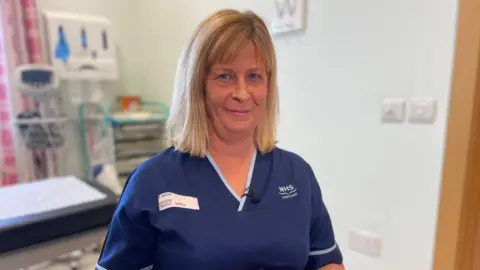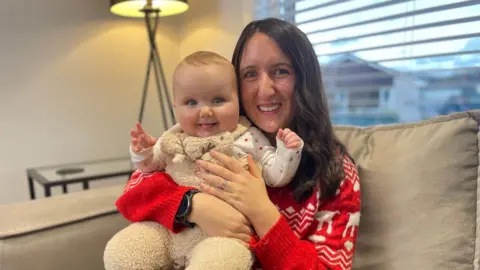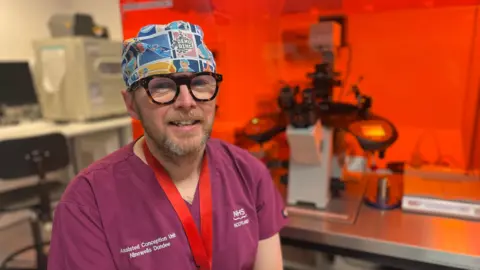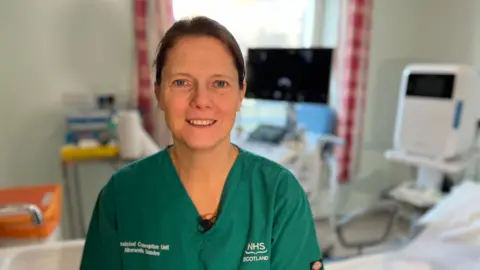'I've helped bring more than 10,000 babies into the world'
 BBC
BBCFor 32 years Maureen Wood has helped couples in Dundee realise their dream of having a baby at the Assisted Conception Unit at Ninewells Hospital.
The senior charge nurse is the longest service member of staff and started working at the unit in 1992.
She estimates that she's helped bring "at least 10,000 babies" into the world by supporting couples through infertility treatments like IVF.
The ACU at Ninewells Hospital was the first place in Scotland to offer IVF to couples struggling to conceive, and this year has marked 40 years since the first IVF baby was born in Dundee.
Ninewells was also the first unit in Scotland to offer NHS-funded IVF treatment.
Maureen told BBC Scotland News: "My most favourite part is the success, but the next part is the patients - going through things with them and being able to support them whether it works or it doesn't.
"It's all about knowing that you're doing your best, that you're caring for them and hopefully giving them everything they need."
The original IVF unit at Ninewells was set up in 1983 using just three rooms, as well as shared ward and theatre space. It was then moved to ward 35 in 1994, with a dedicated procedure room created.
The unit then went under a major refurbishment in 2011 to provide the modern facilities seen today.
It now treats over 700 couples a year.
Maureen said that as the unit has evolved and developed over the past four decades, so too have attitudes towards IVF.
"When the unit opened, we were seeing patients in a corridor for their appointments.
"Nothing was private, you were scanning patients behind a curtain, but now this is such a specialised unit, " she said.
"IVF wasn't widely spoken about but people are a lot more open about things now.
"There are lots of forums where people can go to and speak to people. We have a nurse counsellor here too, so people can come in and discuss things.
"The nurses are all very open with patients and the phones are on 24/7 so that people can call for support."
'If it wasn't for IVF, we wouldn't be parents'

After years of trying to start a family, Kirsty Mathieson and her husband were diagnosed with "unexplained infertility" and started IVF treatment in 2023.
Their first transfer was successful and in March this year they welcomed their daughter Gia into the world.
Kirsty told BBC Scotland News: "It's a long hard journey of waiting, disappointment and heartache but it's worth it.
"Seeing those two lines on your pregnancy test after three years of negative tests, I don't even think I can explain to you the feeling that brings.
"I can't believe that we're actually here and it's worked. At one point she was an embryo in a lab and now she's a full-grown baby."
She added: "We're so thankful that we've been given this opportunity because if it wasn't for IVF, we wouldn't be sitting here today with the chance to be parents."
Kirsty has now started a support group in her local area of Kirriemuir to help other women speak about their fertility struggles.
What is IVF?
- In Vitro Fertilisation (IVF) involves an egg being removed from the person's ovaries and fertilised with sperm in a laboratory
- The fertilised egg is then returned to the person's womb to develop
- IVF worked for the first time on 10 November 1977. On 25 July 1978, the world's first IVF baby, Louise Brown, was born
- The NHS in Scotland provides three funded cycles of IVF treatment for women under 40.
- Women aged between 40 and 42 are offered one round of IVF if they fit certain criteria.

Phillip Milne is an embryologist who creates the embryos that are then transferred into patients' wombs before hopefully developing into a pregnancy.
It's also his job to update patients on how their embryos are progressing within the lab at Ninewells.
He told BBC Scotland News: "We have good times, and we have bad times when we speak to patients.
"You have to take the rough with the smooth sometimes and it can be very difficult speaking to patients when things aren't going well. You can get quite emotional with patients, you do feel quite responsible for what you do.
"Even though the embryo quality is out of your hands, if things are not going well then it can really impact how you feel that day. You want to do the best for the patients."
Inside the Dundee lab, around 7,000 embryos are currently held in a freezer tank filled with liquid nitrogen at a temperature of –190C. These embryos may be used for further treatment and can be stored safely for up to 55 years in the UK.
Technology is constantly developing, and the Assisted Conception Unit is now trialing AI to help them identify eggs that are suitable for fertilisation once they have been collected.
Advances in technology means pregnancy rates have improved significantly in recent years.
Phillip said: "We often have patients coming in with babies, I have so many pictures of me with babies.
"It's really nice to see them start as a single cell and then see them fully grown."

Dr Sarah Martins Da Silva is a consultant gynaecologist and is the clinical lead for fertility services at NHS Tayside.
She also works in infertility research.
She told BBC Scotland News: "The history of IVF is an incredible one. It's a story of research and endeavor.
"There's been so many fundamental changes over time as our knowledge has grown.
"The drugs have changed, the treatments have changed, the laboratories have evolved, the technology has exploded, and I think the good thing is the success rates are much better than they used to be."
She said: "The harsh reality is that a cycle of treatment is likely to be 30-35% successful in having a baby, so we've still got a long way to go.
"Infertility is still a taboo subject, people still feel less likely to share that openly with friends or colleagues, so we still have a way to go to make that conversation part in parcel of the greater public domain, but overall I really do think we're making progress."
If you have been affected by any of the issues raised in this article you can access support through the BBC Action Line.
